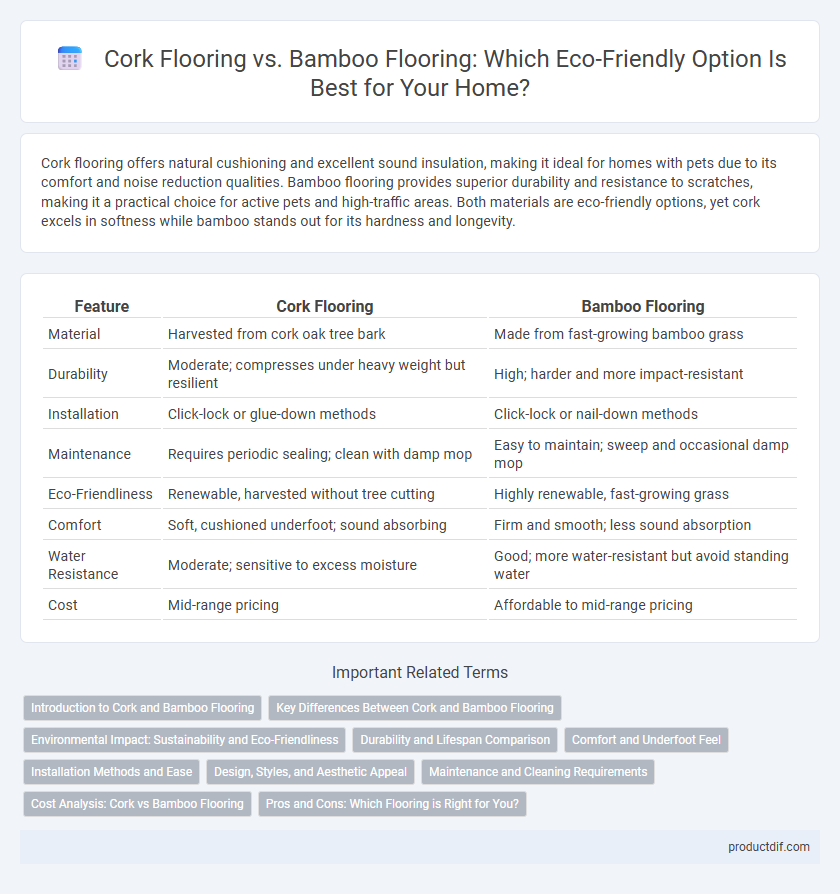Cork flooring offers natural cushioning and excellent sound insulation, making it ideal for homes with pets due to its comfort and noise reduction qualities. Bamboo flooring provides superior durability and resistance to scratches, making it a practical choice for active pets and high-traffic areas. Both materials are eco-friendly options, yet cork excels in softness while bamboo stands out for its hardness and longevity.
Table of Comparison
| Feature | Cork Flooring | Bamboo Flooring |
|---|---|---|
| Material | Harvested from cork oak tree bark | Made from fast-growing bamboo grass |
| Durability | Moderate; compresses under heavy weight but resilient | High; harder and more impact-resistant |
| Installation | Click-lock or glue-down methods | Click-lock or nail-down methods |
| Maintenance | Requires periodic sealing; clean with damp mop | Easy to maintain; sweep and occasional damp mop |
| Eco-Friendliness | Renewable, harvested without tree cutting | Highly renewable, fast-growing grass |
| Comfort | Soft, cushioned underfoot; sound absorbing | Firm and smooth; less sound absorption |
| Water Resistance | Moderate; sensitive to excess moisture | Good; more water-resistant but avoid standing water |
| Cost | Mid-range pricing | Affordable to mid-range pricing |
Introduction to Cork and Bamboo Flooring
Cork flooring is made from the bark of the cork oak tree, offering natural insulation, durability, and a soft underfoot feel ideal for reducing noise and impact. Bamboo flooring, derived from fast-growing bamboo grass, provides a sustainable, hard-wearing surface that withstands heavy foot traffic and resists moisture better than traditional hardwoods. Both flooring options emphasize eco-friendliness and renewable resources, catering to environmentally conscious homeowners seeking stylish, resilient surfaces.
Key Differences Between Cork and Bamboo Flooring
Cork flooring offers superior sound absorption and natural warmth due to its cellular structure, whereas bamboo flooring provides higher hardness and durability, making it better suited for high-traffic areas. Cork is more resistant to moisture and mold, making it ideal for basement or bathroom applications, while bamboo tends to be more susceptible to water damage without proper sealing. Both materials are eco-friendly, but cork is harvested from the bark of cork oak trees without tree removal, while bamboo is a rapidly renewable grass species with faster growth cycles.
Environmental Impact: Sustainability and Eco-Friendliness
Cork flooring is highly sustainable, harvested from the bark of cork oak trees without harming the tree, allowing continuous regrowth and carbon sequestration. Bamboo flooring grows rapidly and requires minimal pesticides, making it a renewable resource, but concerns about carbon emissions from processing and transportation remain. Both materials offer eco-friendly alternatives to traditional hardwoods, with cork excelling in biodegradability and bamboo providing a durable, fast-renewing option.
Durability and Lifespan Comparison
Cork flooring offers moderate durability with a typical lifespan of 10 to 30 years, making it resistant to impacts and providing natural cushioning. Bamboo flooring, known for its high hardness and resilience, often lasts 20 to 25 years or more with proper maintenance, outperforming cork in heavy-traffic areas. Both materials benefit from eco-friendly production, but bamboo's superior density contributes to enhanced longevity and wear resistance.
Comfort and Underfoot Feel
Cork flooring offers superior comfort with its natural cushioning and excellent shock absorption, making it gentle on joints and ideal for standing over long periods. Bamboo flooring provides a firmer, more solid underfoot feel, combining durability with a smooth surface that supports stability. Both materials enhance indoor comfort but cater to different preferences for softness and firmness underfoot.
Installation Methods and Ease
Cork flooring typically uses click-lock or glue-down installation methods, allowing for straightforward DIY application on smooth, level surfaces. Bamboo flooring installation involves either nail-down, click-lock, or glue-down techniques, with strand-woven bamboo requiring a more precise subfloor preparation for stability. Both materials offer user-friendly options, but cork's flexibility and softer texture make it easier to handle during installation compared to bamboo's denser and harder composition.
Design, Styles, and Aesthetic Appeal
Cork flooring offers a warm, natural look with unique cellular patterns that enhance cozy and eco-friendly interiors, available in various shades from light tan to rich brown. Bamboo flooring boasts a sleek, modern aesthetic with its smooth grains and a wide range of colors, including natural blonde, carbonized tones, and exotic stained finishes. Both materials support diverse design styles, with cork excelling in rustic and Scandinavian themes, while bamboo complements contemporary and minimalist spaces.
Maintenance and Cleaning Requirements
Cork flooring requires regular sealing every few years to maintain its moisture resistance and prevent damage, while bamboo flooring benefits from occasional refinishing to address surface wear. Both materials demand gentle cleaning with pH-neutral cleaners to avoid surface degradation, but cork is more susceptible to water damage due to its porous nature. Bamboo's hardness makes it more resistant to dents and stains, reducing maintenance frequency compared to cork.
Cost Analysis: Cork vs Bamboo Flooring
Cork flooring typically costs between $3 and $8 per square foot, making it a mid-range option for eco-friendly floors. Bamboo flooring prices vary from $2 to $6 per square foot, generally offering a more affordable alternative with comparable durability. Installation costs for both materials average $3 to $5 per square foot, but bamboo's lower base price often results in overall reduced expenses.
Pros and Cons: Which Flooring is Right for You?
Cork flooring offers excellent comfort underfoot, natural insulation, and is eco-friendly due to its renewable harvesting process, but it is prone to moisture damage and may require sealing. Bamboo flooring provides exceptional durability, a sleek modern look, and faster regrowth rates compared to traditional hardwoods, though it can be susceptible to scratches and varies in quality depending on manufacturing methods. Choosing between cork and bamboo flooring depends on your priorities for comfort, maintenance, durability, and environmental impact.
Cork Flooring vs Bamboo Flooring Infographic

 productdif.com
productdif.com